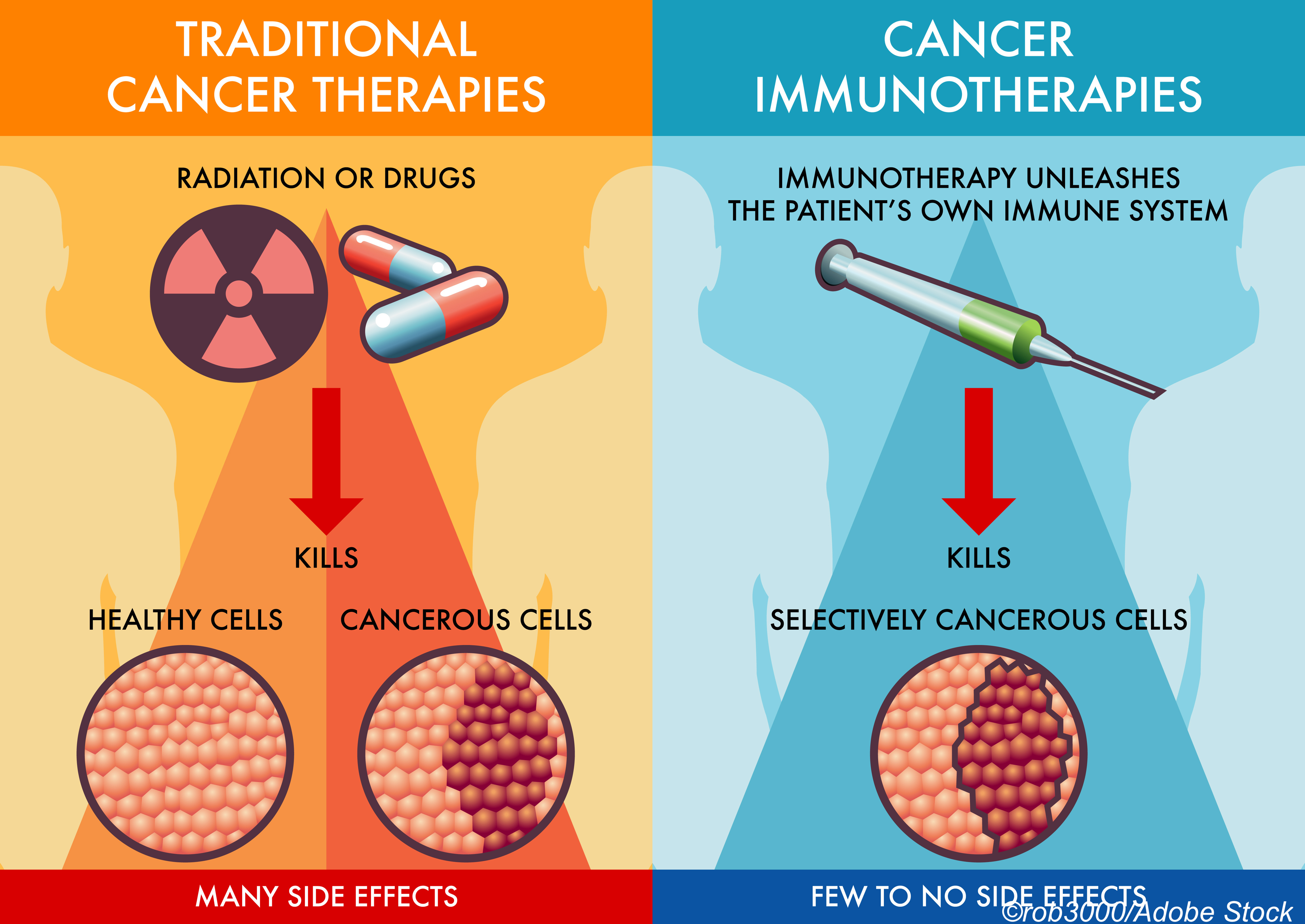Results from early phase clinical trials suggest that patients with advanced solid tumors achieve benefit with a novel target, researchers reported at the 2021 virtual meeting of the European Society for Medical Oncology.
The target in this case is B7 homologue 3 (B7-H3), a transmitter protein that is overexpressed in a number of solid tumors, including lung, prostate, esophageal, and breast cancers. In a Proffered Paper Presentation, Melissa Johnson, MD, of Sarah Cannon Research Institute, Nashville, said that developing an antibody-drug conjugate (ADC) agent to inhibit B7-H3 was attractive for many reasons, including the potential for a high potency payload—exatecan derivative—and the advantage of a short systemic half-life, as well as the bystander antitumor effect seen with already approved ADCs.
In this Phase I/II dose escalation trial, Johnson and colleagues tested 8 different regimens of DS-7300 in 70 patients. Fifteen patients achieved an objective response and 32 patients achieved disease stabilization, yielding a net clinical benefit rate of 67%. Six patients are still being evaluated. Johnson said that 24 of the patients with stable disease are still on treatment.
“In this first-in-human trial of single-agent DS-7300, no dose limiting toxicities were observed,” she said. “DS-7300 was generally well tolerated across all doses investigated to date in heavily pretreated patients with advanced solid tumors.”
Johnson said that patients who have tumors that overexpress B7-H3 have a poor prognosis. “B7-homologue 3 is a transmembrane protein overexpressed in various cancers, including lung, prostate, esophageal, and breast cancers, and head and neck squamous cell carcinoma,” she said in her oral presentation.
In the study, Johnson and colleagues enrolled patients with advanced or unresectable solid tumors. Patients received intravenous doses of 0.8 mg/kg; 1.6 mg/kg; 3.2 mg/kg; 4.8 mg/kg; 6.4 mg/kg; 8.0 mg/kg; 12 mg/kg; and 16 mg/kg. The researchers intended to enroll 25 patients with esophageal squamous cell carcinoma; up to 40 patients with metastatic castration resistant prostate cancer; and up to 40 people diagnosed with small cell lung cancer.
At the time of reporting, Johnson had recruited 24 men with castration resistant prostate cancer; 12 patients with head and neck squamous cell carcinoma; 8 patients with sarcoma; 8 patients with endometrial cancer; and a smattering of 6 other cancer types. The median number of previous lines of treatment was 4, but ranged from 1 to 10, she reported.
Treatment duration was a median of 13.1 weeks across all doses, and virtually all the patients experienced some treatment-emergent adverse event. However, serious treatment emergent adverse events were experienced by 21.4% of the patients, and 10 of the 15 serious adverse events occurred with the three highest doses. Two patients in the study died from treatment-related events: one patient received the 8 mg/kg, the other received the 16 mg/kg dose.
The designated discussant, Elena Garralda, MD, of the Val d’Hebron Institute of Oncology, Barcelona, noted that the U.S. Food and Drug Administration has already approved 10 ADCs, and six of those approvals occurred in the last 2 years. Thus, “the development and use of antibody-drug conjugates has clearly increased of the past year. However, we only have 4 of these drugs that are targeted at solid tumors.” The 4 drugs are aimed at HER2 positive tumors, bladder cancer, and triple negative breast cancer, she said.
There are, she noted, three ADCs targeting B7-H3. In addition to DS-7300, MGC018 (duocarmycin payload) and ABBV-155 (BCL-XL inhibitor payload).
Despite numerous trials using various agents to attack solid tumors, the number of approved drugs is small, which underlines the difficulty in developing these agents, Garralda said.
In the development of DS-7300, “what I would highlight is that there were no dose limiting toxicities in the dose escalation, and that most of the adverse events were low grade,” she said. “However, about 40% of patients had infusion-related reactions, and 3% of the patients had interstitial lung disease.”
Garralda noted that interstitial lung disease has been seen with other antibody-drug conjugates, and the condition can be fatal. “We need to know how often this toxicity occurs and how it is managed,” she said. She also noted in the dose escalation, some responses were seen among patients receiving lower doses of the medication.
She suggested, “When we consider toxicities, we need to remember to watch not only the target but also the payload.”
“As the antibody-drug conjugate portfolio continues to expand,” Garralda said, “we have to consider in a particular patient what will be the target expression or the likelihood of expression, the payload sensitivity, the different antibody-drug conjugate toxicity profile and this will include comorbidities and include patients’ preferences, previous treatment history and finally, the possibility of combinations.”
-
DS-7300 shows promising activity during these early stage studies against patients who have been heavily-treated for advanced solid cancers.
-
Be aware that this activity discusses investigational agents that are not yet approved for clinical use.
Edward Susman, Contributing Writer, BreakingMED™
The trial was funded by Daiichi Sankyo.
Johnson disclosed relationships with Otsuka; Genentech/Roche; Boehringer Ingelheim; AstraZeneca; Calithera Biosciences; Merck; Loxo; Sanofi; Mirati Therapeutics; Astellas Pharma;: Pfizer; Guardant Health; Ribon Therapeutics; Incyte; Abbvie; Achilles Therapeutics; Atreca; GlaxoSmithKline; Gritstone Oncology; Janssen Oncology; Lilly; Novartis; Amgen; Bristol-Myers Squibb; Daiichi Sankyo; EMD Serono; G1 Therapeutics; WindMIL; Checkpoint Therapeutics; AstraZeneca; Kadmon; Mirati Therapeutics; Genmab; CentRx; Array BioPharma; Regeneron; Hengrui Pharmaceutical; Lycera; BeiGene; Tarveda Therapeutics; Daiichi Sankyo;: CytomX Therapeutics; Dynavax Technologies; Corvus Pharmaceuticals; Genocea Biosciences; Adaptimmune; Syndax; Neovia Oncology; Acerta Pharma; Takeda; Shattuck Labs; Apexigen; OncoMed; Immunocore; Jounce Therapeutics; TCR2 Therapeutics; Arcus Biosciences; BerGenBio; Tmunity Therapeutics, Inc.; Seven and Eight Biopharmaceuticals; Rubius Therapeutics; Silicon Therapeutics; Dracen; PMV Pharma; and Artios.
Garralda disclosed relationships with Novartis, Roche, Thermo Fisher, AstraZeneca, Taiho, Roche/Genentech, F. Hoffmann/La Roche, Ellipses Pharma, Neomed Therapeutics, Boehringer Ingelheim, Janssen Global Services, SeaGen, TFS, Alkermes, Bristol-Myers Squibb, MabDiscovery, Anaveon, Merck Sharpe and Dohme, and Lilly.
Cat ID: 116
Topic ID: 78,116,728,791,730,116,22,697,192,925,696



